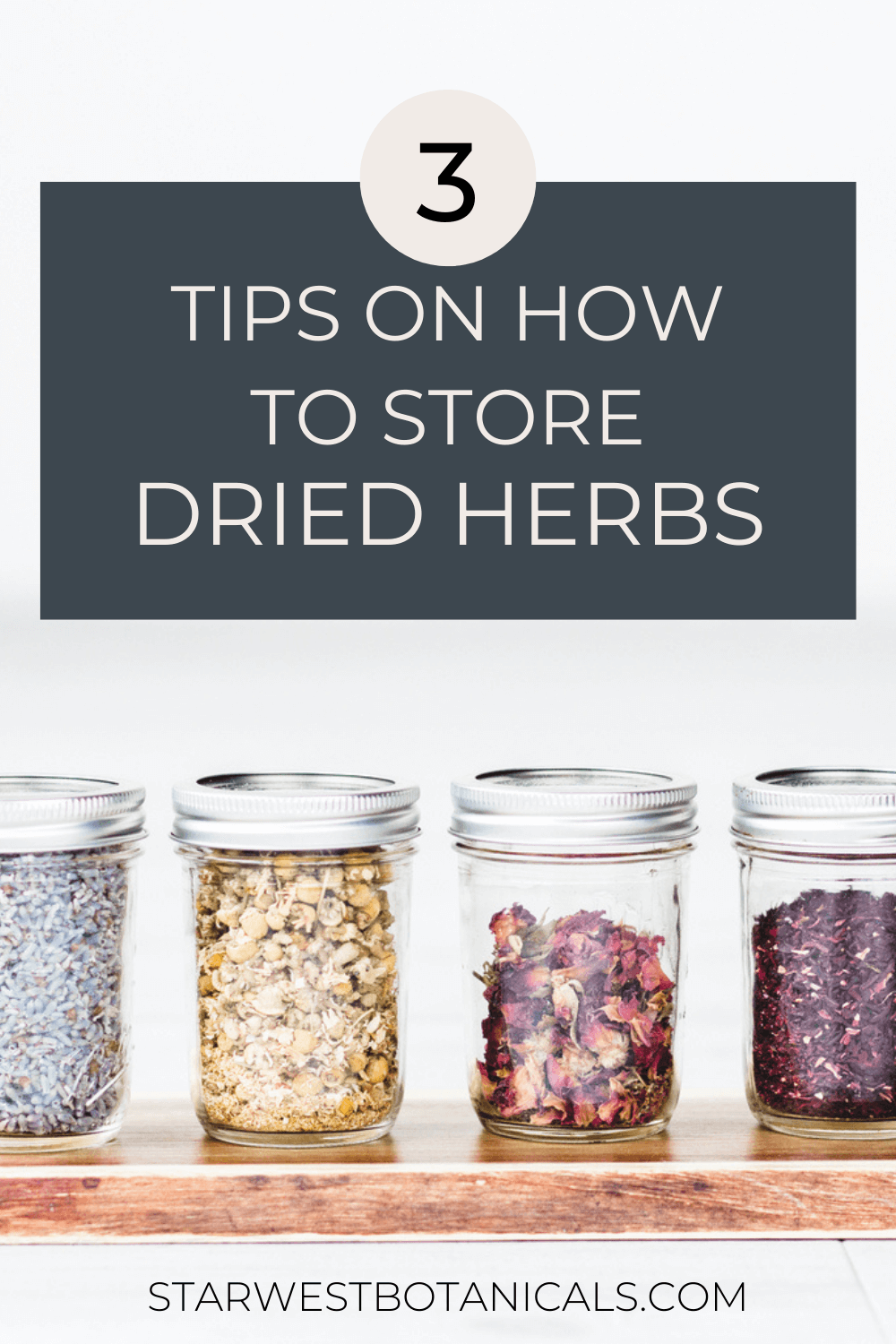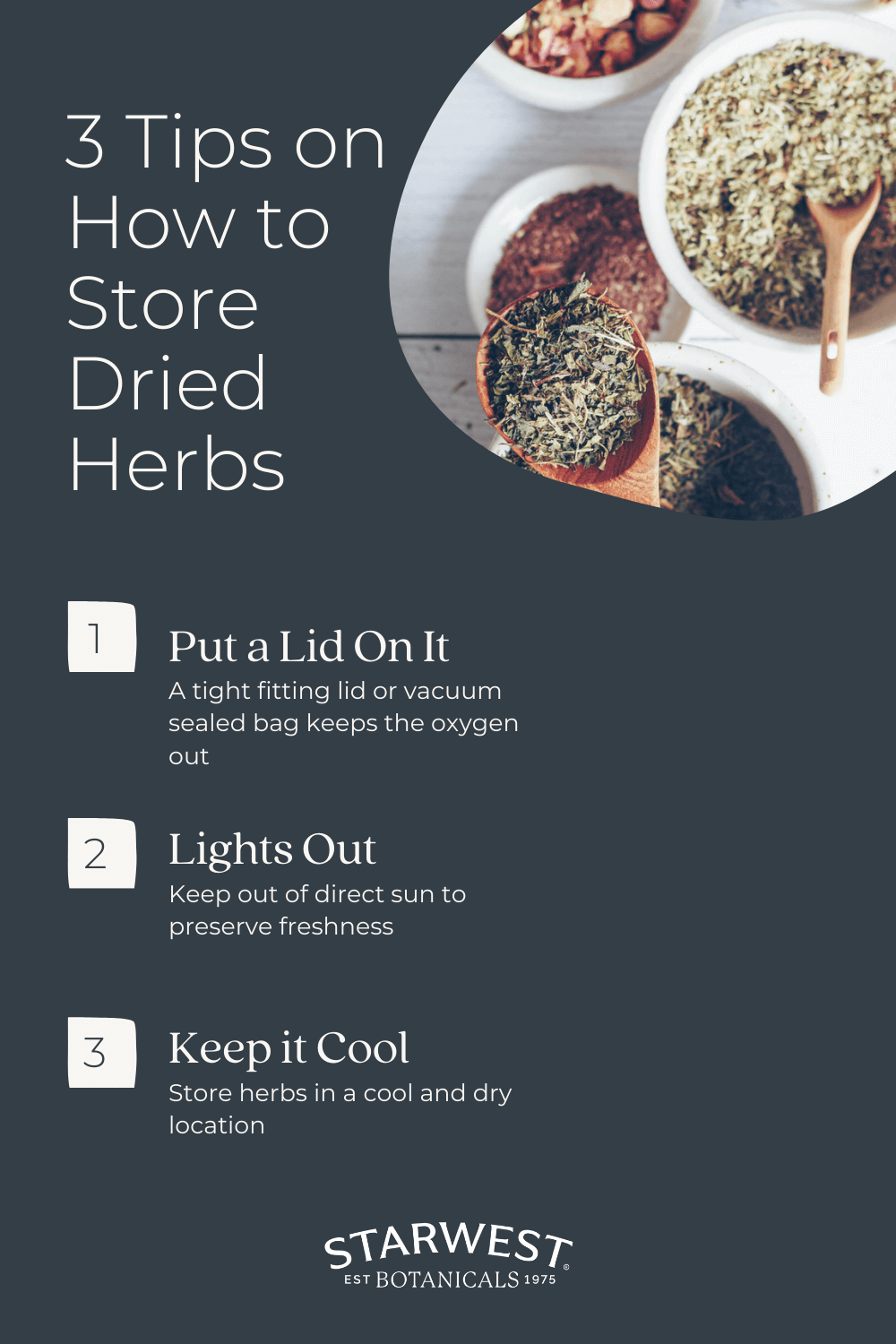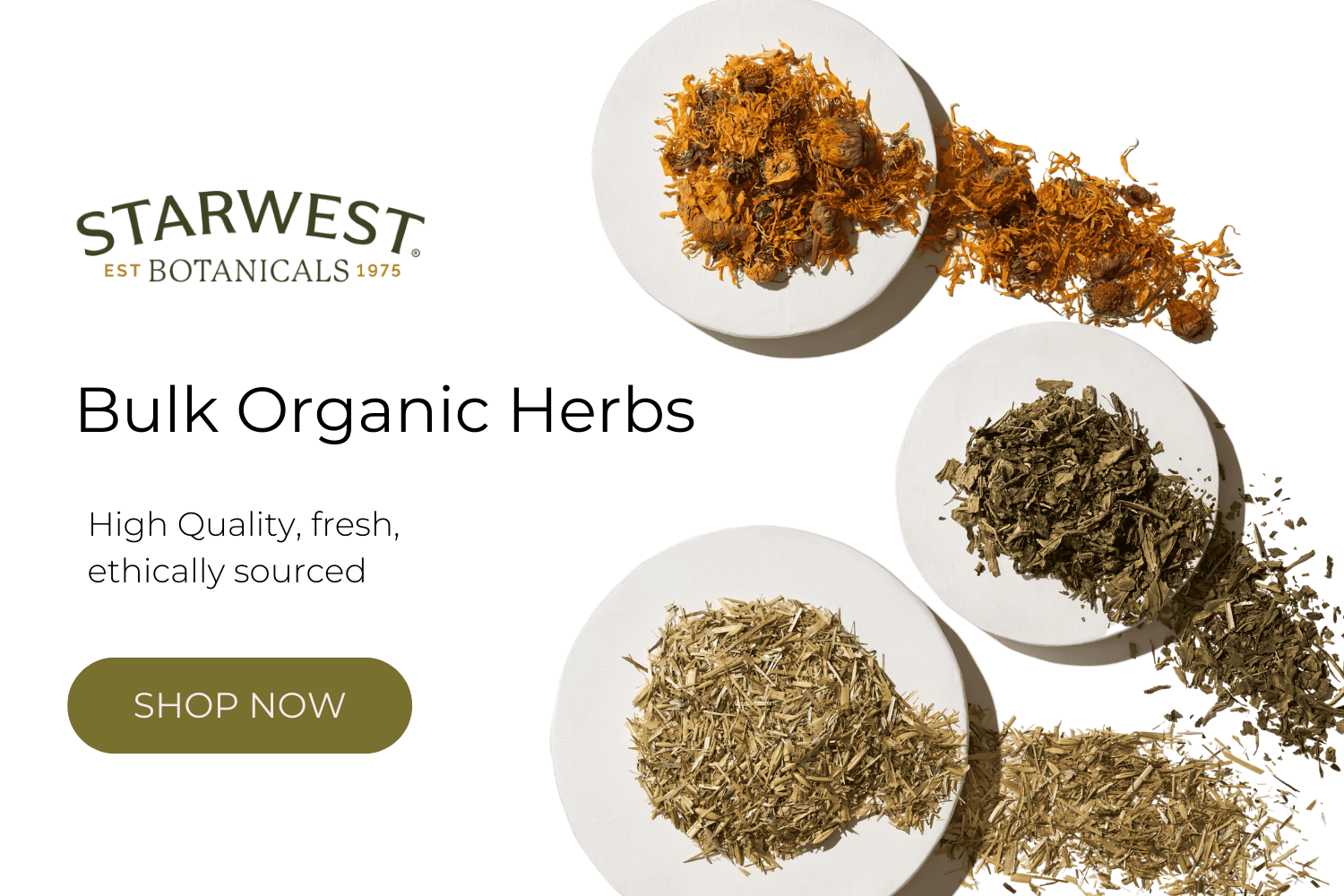3 Tips on How to Store Dried Herbs | Starwest Botanicals
Posted by Starwest Botanicals Content Team | Medically Reviewed by Daniel Powers, MS on 07-19-2022

3 Tips on How to Store Dried Herbs
From thyme and tarragon to marjoram and mint, having a diverse collection of dried herbs is the key to a complete, well-rounded pantry. However, as your dried herb collection grows, you might find yourself running out of shelf space—and wondering about the best way to store dried herbs and spices.
Since herbs can be complex, it’s important to understand the difference between herbs vs. spices and dried vs. fresh herbs. Making sure that you consider each dried herb’s unique storage needs—and having the proper containers in which to keep them—is essential to ensuring maximum potency and freshness.
Not sure where to begin? Read on for three easy tips on how to store dried herbs.
Tip #1: Put a Lid On It
How long do dried herbs last? One of the primary mistakes that you might be making when storing your dried herbs and spices is neglecting to keep them airtight. While dried herbs have a significantly longer shelf life than fresh-from-the-garden herbs, there are still a number of factors that can lead to loss of freshness, taste, aroma, or potency.
One major (but invisible) culprit that can lead to stale dried herbs? Oxygen.
While oxygen is essential to the plants your fresh herbs and spices come from, it can cause dried herbs to oxidate. Oxidized ground spices can lead to dull or off-tasting flavors in your dishes and, if used in tablets or teas for their health benefits, may result in reduced efficacy.
To keep oxidation damage from spoiling your at-home herbs and spices:
- Look for sturdy containers with lids that can be sealed to keep the contents airtight. Consider using glass jars with tight-fitting lids designed to keep oxygen out—and freshness in.
- Try storing your ground spices in vacuum-sealed bags. This technique ensures air and excess moisture stay away from your spices, keeping them fresher, longer.
Tip #2: Lights Out
While you might not think much of leaving your dried herbs on a sunny windowsill or on a countertop underneath a light fixture, many leafy herbs can actually be very sensitive to light.
Herbs like basil, parsley, and chives are particularly light-sensitive, as are any soft herbs that contain compounds like carotenoids or chlorophyll.
Some example of soft herbs high in these compounds include:
- Basil
- Calendula flowers
- Dandelion
- Stinging nettle
- Coriander
- Parsley
- Alfalfa
- Moringa
- Chlorella
- Cilantro
- Spirulina
When exposed to direct sunlight over time, these herbs can begin to degrade. Their bright colors, unique tastes, and distinct aromas may fade—along with their potency in cooking or in herbal remedies.
Fortunately, there are plenty of ways to protect your herbs from light damage:
- One easy way to do this is by keeping them away from direct sunlight and inside of a cabinet or drawer where they won’t be exposed to as much sunlight.
- Another clever method of protecting your chopped herbs is by keeping them inside tinted glass containers. Tinted glass helps preserve the longevity of your herbs by shielding them from the UV rays that can cause light damage. Using a container with dark amber glass can stop up to 99% of UV ray penetration, keeping your chopped herbs fresher for longer.
Look for containers made of either dark blue cobalt glass or dark amber glass. Both types of glass are dark enough to block UV rays while also keeping your herbs visible.
Tip #3: Keep it Cool
When deciding on the best way to store your dried herbs and spices, be sure not to overlook another essential factor: temperature.
Just as you would never store raw meat on the countertop at room temperature or cans of soda in your freezer—you’ll need to consider the optimal temperature at which to store your herbs and spices, too. Many of your favorite dried herbs need to be kept at particular temperatures to ensure maximum freshness, flavor, and potency.
Warm, humid air can cause dried herbs to break down or turn stale at a faster rate. For maximum freshness, keep all of your herbs in a cool, dry location such as a cupboard or drawer in your kitchen—the further away from a hot oven, the better.
Certain herbs and spices should be kept cool in the fridge rather than stored at room temp. These include:
- Red pepper
- Paprika
- Chili powder
- Sesame seeds
- Poppy seeds
While freezing your herbs and spices can be a clever way to expand their lifespan, there’s a particular way you’ll want to go about it:
- For starters, be mindful of the kind of containers you’re using to store them. While glass can often be a trusted option, remember that it can sometimes fall victim to thermal shock when suddenly exposed to high temperatures after freezing. Opt for a plastic jar or jug with lids that’ll keep the threat of freezer burn at bay.
- Avoid thawing and re-freezing any herbs that you’ve stored in your freezer for later use. Instead, thaw only the amount you’ll need for a particular recipe, leaving the rest in their original, freezer-safe containers. A clever way to do this is by storing your immune boosting herbs in pre-portioned amounts, using a plastic or silicone ice cube tray.

Starwest Botanicals: Your Source for High-Quality Herbs and Spices
Dried herbs and spices typically have a lengthy shelf life, but that shelf life often relies on smart storage choices. Keep your favorite medicinal herbs safe from any risk factors like oxidation, light, or less-than-ideal temperatures by storing them in airtight, opaque containers in a cool, dry place.
Follow these tips for how to store your herbs and spices. That way, you’ll be able to enjoy the benefits of your dried herbs and spices for months to come.
Starwest Botanicals has everything you need to get started on your herbal journey. Peruse our shelves of high-quality dried herbs, purchase them in bulk, and ensure their safekeeping by storing them in our expertly-crafted bottles and containers.
Get the very best of bulk dried herbs and spices today with Starwest Botanicals.
Sources:
Raise Your Garden. Storing Dried Herbs and Other Spicy Tips. https://raiseyourgarden.com/home/storing-your-dried-herbs-other-spicy-tips
Science Direct. Dried Herbs. https://www.sciencedirect.com/topics/agricultural-and-biological-sciences/dried-herbs
Natural Products Chemistry & Research. Carotenoid Profiles of Dried Herbs. https://www.iomcworld.com/open-access/carotenoid-profiles-of-dried-herbs-water-infusions-and-alcoholic-tinctures-2329-6836.1000160.pdf
Iowa State University. Amber Glass for Canning and More. https://blogs.extension.iastate.edu/answerline/2018/08/30/amber-glass-for-canning-and-more
Living Well Spending Less. How to Store and Organize Your Spices. https://www.livingwellspendingless.com/store-organize-spices



